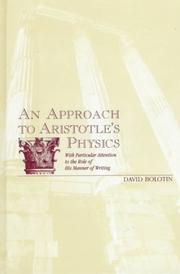| Listing 1 - 6 of 6 |
Sort by
|
Book
ISBN: 0801412277 9780801412271 Year: 1979 Publisher: Ithaca (N.Y.): Cornell university press
Abstract | Keywords | Export | Availability | Bookmark
 Loading...
Loading...Choose an application
- Reference Manager
- EndNote
- RefWorks (Direct export to RefWorks)
Friendship --- Plato --- Affection --- Friendliness --- Conduct of life --- Interpersonal relations --- Love --- Aflāṭūn --- Aplaton --- Bolatu --- Platon, --- Platonas --- Platone --- Po-la-tʻu --- Pʻŭllatʻo --- Pʻŭllatʻon --- Pʻuratʻon --- Πλάτων --- אפלטון --- פלאטא --- פלאטאן --- פלאטו --- أفلاطون --- 柏拉圖 --- 플라톤 --- Friendship. --- Plato. --- Plato - Lysis
Book
Year: 1979 Publisher: Ithaca-London Cornell University Press
Abstract | Keywords | Export | Availability | Bookmark
 Loading...
Loading...Choose an application
- Reference Manager
- EndNote
- RefWorks (Direct export to RefWorks)
Book
Year: 1998 Publisher: Albany, NY : State University of New York [SUNY] Press,
Abstract | Keywords | Export | Availability | Bookmark
 Loading...
Loading...Choose an application
- Reference Manager
- EndNote
- RefWorks (Direct export to RefWorks)
Book
ISBN: 9780881466645 9780881466638 Year: 2018 Publisher: Macon Mercer University Press
Abstract | Keywords | Export | Availability | Bookmark
 Loading...
Loading...Choose an application
- Reference Manager
- EndNote
- RefWorks (Direct export to RefWorks)
Philosophy of mind --- Philosophy of mind. --- Psychology --- Psychology. --- Soul --- Soul.

ISBN: 0585092052 9780585092058 0791435512 0791435520 0791497038 Year: 1998 Publisher: Albany, NY State University of New York Press
Abstract | Keywords | Export | Availability | Bookmark
 Loading...
Loading...Choose an application
- Reference Manager
- EndNote
- RefWorks (Direct export to RefWorks)
Argues that Aristotle's writings about the natural world contain a rhetorical surface as well as a philosophic core and shows that Aristotle's genuine views have not been refuted by modern science and still deserve serious attention.
Aristotle --- Physics --- Early works to 1800 --- Greek language --- Style --- Philosophy [Ancient ] --- PHYSICS --- ARISTOTLE --- GREEK LANGUAGE --- PHILOSOPHY, ANCIENT --- SCIENCE --- PHILOSOPHY --- FOREIGN LANGUAGE STUDY --- Greek Language --- Philosophy, Ancient --- Science --- Philosophy --- Foreign Language Study --- Philosophy, ancient --- Foreign language study
Book
ISBN: 9780881467840 0881467847 9780881467833 0881467839 Year: 2021 Publisher: Macon, Georgia Mercer University Press
Abstract | Keywords | Export | Availability | Bookmark
 Loading...
Loading...Choose an application
- Reference Manager
- EndNote
- RefWorks (Direct export to RefWorks)
"David Bolotin's translation of Aristotle's Parva Naturalia aims above all at fidelity to the Greek. It treats Aristotle as a teacher regarding the topics that he discusses, and hence it tries to convey the meaning, to the extent possible in English, of his every word. Aristotle clearly intended these treatises as a sequel to his De Anima and Bolotin's translation is a sequel to his translation of that work. The title Parva Naturalia goes back to the late Middle Ages, and though the traditional grouping doesn't include the treatise On the Motion of Animals, it is included here, since there is strong manuscript evidence, as well as solid substantive reasons, that it ought to be included. Bolotin has made a scrupulous effort to examine the manuscript tradition, and he has relied only on readings that are well attested in the oldest manuscripts, rather than accepting conjectural emendations of modern editors, who too often substitute a Greek text that is easy to understand for any of those that have come down to us from the ancient copyists. Since Bolotin's translation, though it aims at the greatest possible clarity in English, subordinates felicity of English expression to the demand for fidelity to the Greek, it may not be suitable for all readers. But for those who wish to study the Parva Naturalia with care, it offers access that has hitherto been unavailable in English to the precise meaning of Aristotle's text"--
Psychology --- Zoology --- Animal locomotion
| Listing 1 - 6 of 6 |
Sort by
|

 Search
Search Feedback
Feedback About UniCat
About UniCat  Help
Help News
News